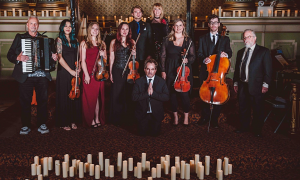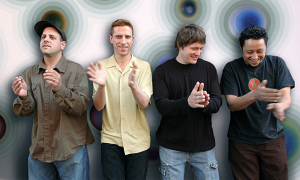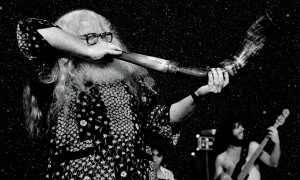Home » Jazz Articles » From the Inside Out » Riding Waves, Moving Boundaries, and Building The Wall
Riding Waves, Moving Boundaries, and Building The Wall
 Franco Ambrosetti Quintet
Franco Ambrosetti QuintetLong Waves
Unit Records
2019
Trumpeter Franco Ambrosetti balances in the middle of three jazz generations, the father of saxophonist Gianluca and son of saxophonist Flavio, who once played opposite Charlie Parker at the Paris Jazz Festival. Although he grew up studying classical piano, which you strongly hear in the long lines of his lyrical playing, he picked up trumpet at age 17.
Ambrosetti was profoundly changed when he inevitably discovered Miles Davis. "Miles sometimes was playing just three notes but with so much intensity, and especially when he was playing a ballad," Ambrosetti notes. "So, from listening to Miles I learned about stretching a note when you play a melody. Instead of playing the notes shorter or staccato, you stretch the notes out like you're really singing. And I think I can express my feelings more if I really cry that note."
Beautiful cries from Ambrosetti's trumpet make Long Waves a lyrical masterpiece worth mentioning in the same whispered breath as the legendary Davis. But there are other good reasons, too. Ambrosetti strategically surrounds himself with a generational cast of first-class musicians, technicians and visionaries, as Davis did with his first and second great quintets; for Long Waves, a rhythm section of bassist Scott Colley and drummer Jack DeJohnette plus pianist Uri Caine and guitarist John Scofield.
Tunes include two jazz standards that further conjure Davis' influential ghost: A nine-minute visit with "Old Folks" which begins and ends with piano and flugelhorn in misty reverie played so true and recorded so cleanly that their sound waves wash like ripples of soft and sad emotion into your mind; and a cool brisk walk through colors and corners "On Green Dolphin Street" to close the set.
"One For The Kids" bubbles up the flipside to those "Old Folks" on a bouncy mix of New Orleans funk and jazz drumming, slipping and sliding into Ambrosetti's trumpet melody and eventually a cool, long-striding bop section where Scofield and the leader swap sharp funk chops and Caine tosses back some double-barreled piano boogie of his own.
Long Waves also includes two love letters to the trumpeter's wife Silli, the shimmering "Silli's Long Waves" and languid "Silli's Waltz," which bobs and weaves on the rhythmic ripples of DeJohnette's cymbals and snare. But this entire set is Ambrosetti's love letter to the powerful joy of creating beautiful art. "After one rehearsal, I felt like I had played with this group every night for the last five years," he said upon its release. You hear it in this music for sure.
 Dave Bass
Dave BassNo Boundaries
Whaling City Sound
2019
In 2015, Dave Bass retired from the Office of the Attorney General of California after twenty years of service and returned to his first professional love—playing the piano, a career that a wrist injury forced him to abandon about thirty years ago. No Boundaries is the third release, and second for Whaling City Sound, in Bass' comeback. "My first two CDs were recorded while I was still working as a lawyer, during whatever vacation time I could amass," he explains.
Bass seems intent on proving the title of No Boundaries by opening and closing it with tunes by two of modern music's most challenging pianists. "To my mind, Lennie Tristano and Bud Powell are connected, which is why I begin and end with their compositions," the pianist explains. "Just the linear approach in the heads show how they spent a lot of time playing classical repertoire, then went their own way." The oddly shaped melody of "Lennie's Pennies," which Bass has been playing since the 1970s, illuminates the colorful rhythmic and harmonic connections between his piano, Carlos Henriquez's bass and Jerome Jennings' drums. And Bass hauls piano ass through the closing "Hallucinations" like a jackrabbit with its tail on fire, tangling and untangling complicated and crackling lines like electric lightning.
Three tracks that swap Jennings out for percussionists Carlos Caro, Mauricio Herrera and Miguel Valdes pull No Boundaries into Latin jazz, but it's no stretch. "All three are from Cuba," Bass says, "and their rhythm is so strong that you can play anything on top of them." In "Siboney" and especially "La Mulata Rumbera," Bass illustrates precisely that, driving his piano through two different active lines simultaneously, twinkling and wrinkling the upper register while his left hand stomps out rhythm with flamenco fury—simply great Latin jazz piano.
Bass just keeps pushing (stylistic) walls down: A cinematic moody brooding with saxophonist Ted Nash titled "Spy Movie End Credits" because it "just sounded that way"; channeling bop pianist Elmo Hope through the thick, knotty James Joyce nod "Agenbite of Inwit"; and a gorgeous "If I Loved You" that showcases Karrin Allyson's simply breathtaking vocal from the Rodgers/Hammerstein songbook.
Multi-instrumentalist Nash contributes saxophones, clarinets, and flutes, and co-produced No Boundaries with Bass. "I don't generally produce other people's records, but I really think that Dave is an evocative composer and I believe in his vision," suggests Nash. "I love his passion. He has the enthusiasm of a college student, plus maturity, and he's hearing very personal sounds."
 Club d'Elf
Club d'ElfNight Sparkles (Live)
Face Pelt Records
2019
On December 16, 2011, bassist and bandleader Mike Rivard and the rest of the floating Club d'Elf instrumental ensemble assembled at the Lizard Lounge in Cambridge (MA), for their regular gig at the regular location in the extended live residency that the band began at the Lounge back in 1998 (and continues to this day). Guest musicians often dropped in after finishing their own Boston area gigs to join the Club and this evening would prove no exception, as Boston resident and master West African drummer Moussa Traore climbed onboard to help power and drive during the band's second set.
"Moussa was someone I had heard a lot about but had never met or had the chance to play with," relates Rivard. "It was immediately apparent that this was going to be serious, and he and our conga player Vicente Lebron had an amazing simpatico. It seemed like a good idea to let the percussion drive the music, and it was one of the more open and organic sets we've played."
Club d'Elf is not a large ensemble: This version features Rivard (bass, sintir) and percussionist Lebron with Dean Johnston (acoustic and electronic drums), Paul Schultheis (synthesizers and keyboards) and David Tronzo (slide, rhythm, and lead electric guitar). And their music is highly repetitive but it is nowhere near simple. In fact, it's quite the opposite: "Open and organic" is a great way to describe the percussion-driven, instrumental ecstatic trance that Night Sparkles reveals.
Edited into a single piece of music in six movements, Night Sparkles transports the listener onto a different plane. Rivard's bass drives and steers the ensemble through the epic two-part adventures "End of Firpo" and "Ecstatic Cling" and tosses the "Ball of Confusion" Motown bass line into the open-ended African funk groove "Dance of the Machine Elves," which also features white-hot percussive interplay between Traore, Lebron and drummer Johnston. Throughout, Tronzo unravels the studied recklessness of Robert Quine into fluorescent threads of jazz, rock, blues and even twangy country-western guitar.
Most of this stuff is just flat-out crazy but in the best possible musical way, as if the Sun Ra Arkestra happened to pick up the Wild Tchoupitoulas on Bourbon Street and then set their controls for the heart of the sun. If you're a fan of their more percussion-driven trance music, Night Sparkles may be your ultimate Club d'Elf release. At least until the next one rolls and thunders along.
 Eumir Deodato
Eumir DeodatoOs Catedráticos 73
Far Out Records
2019
In 1973, Eumir Deodato was riding high upon the GRAMMY® Award-winning success of "Also Sprach Zarathurstra (Theme from 2001: A Space Odyssey)," the Brazilian keyboardist's jazz-rock fusion take on Richard Strauss' classic, from his previous release Prelude (CTI, 1972).
Deodato's next move, Os Catedráticos 73 doesn't mess with that successful formula but throws a lot more of his own keyboard playing on top. For its rhythm tracks, Deodato recorded a Brazilian rhythm machine featuring himself with bassist Sergio Barroso, percussion master Orlandivo, and drummer Ivan Conti ('Mamão') on loan from fusion pioneers Azymuth. Then, he worked with session masters from the CTI Records' house band in New York to shape and place the horns in and on these rhythm arrangements, and crowned it all with his own electric keyboard as the single solo voice on top.
No horn or guitar solos, only keyboard solos, is the unique and best part of Os Catedráticos 73: In this fertile Brazilian-jazz hybrid context, Deodato sounds intent on growing classic '70s soul-jazz keyboard jam: the soul-jazz organ sound of Brother Jack McDuff, but surrounded by the cool, nurturing grooves of Sergio Mendes and Brasil '66.
This purpose sounds quite evident in "Rodando Por Ai (Rudy's)," a Deodato original that funks and chunks along like a Quincy Jones 1970s television theme with keyboards coloring in thick and bright lines and horns shading and blending in around their edges. Horns float "Passarinho Diferente (The Byrd)" skyward like it was a glowing brass balloon from which Deodato pours out glistening, liquid keyboard notes. "The Byrd" pairs up with "Puma Branco (The White Puma)," a lush Brazilian landscape strolled and prowled by powerful and toothsome horns. "Menina (Boy Meets Girl)" opens under echoes of the timeless ballad "Fly Me to the Moon" until the rhythm section pries the lid off the tempo with a loping disco beat.
When first released, "Arranha Ceu (Skyscrapers)," the sonic sister to Deodato's "Zarathustra" monster, was this set's biggest hit. It glides upon a bass line copped from "Memphis Soul Stew" as its firm yet funky disco-jazz foundation, and then horns open up into a day full of bright and brassy sunlight for Deodato's keyboard solos to prowl through and explore.
"Carlota & Carolina (Carly & Carole)" wraps up Os Catedráticos 73 in a push and pull, electric keyboard tune so blue and sweet it paints a picture of Joe Sample and The Crusaders grooving on the beach in Rio.
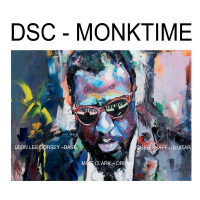 DSC Band
DSC BandMonkTime
Jazz Avenue Records
2019
MonkTime is Leon Lee Dorsey's first album as a leader in twenty years and in this case, patience truly is a virtue: The bassist's tribute to the legendary composer and pianist simultaneously debuts Dorsey's new band, a trio with guitarist Greg Skaff and drummer Mike Clark, the standard for contemporary jazz-rock and jazz-funk drumming who sticks to pure jazz drumming in unique MonkTime.
"We pay tribute to the master in a context not normally associated with Thelonious Monk's music. It's a trio absent of saxophone and piano," Dorsey explains. "I felt from the start that with the chemistry of this band—there's no horn and no piano, the two instruments that defined Monk's sound—we could go to the magical music level."
It's no great revelation that even Monk's most "standard" tunes, such as "Blue Monk" or "Well You Needn't," can sound difficult or at least odd, and that playing such music on completely different instruments can at least potentially present additional challenges. But this trio approaches each tune with great skill and honorable intent, and their music is powerful.
Their production, jointly credited to Skaff and Dorsey, is too: The comfortable space around and between each instrument gives MonkTime an airy and spacious, cool jazz feel. For example, "Monk's Dream" is recorded so cleanly that it gives you the chance to hear the melody split between bassist Dorsey as the pianist's "left hand" and guitarist Skaff as his "right," with Clark's butterfly cymbals fluttering between to connect them both.
Taking on "Well You Needn't" as their opener quickly proves the band's chops. Skaff keeps churning ideas in a quicksilver sound that stitches together jazz and blues while bassist and drummer sound intuitively connected until Dorsey's bass solo climbs up and down inside Monk's construction. "Blue Monk" opens with Skaff's solo guitar see-sawing up and down its fretboard with a clean blues sound until the rhythm section tumbles in like a child trundling downstairs to greet Christmas morning, and then steps out in a high-spirited yet lowdown walking blues.
In "Little Rootie Tootie,"one of the composer's own favorites (named after Monk's son, nicknamed "Toot"), strummed guitar chords ring out like the brassy horns that ignited arranger Hall Overton's stunning horn chart for The Thelonious Monk Orchestra at Town Hall (Columbia, 1959), which were based on Monk's introductory improvisation on the original version (from Thelonious Monk Trio [1952, Prestige]).
It's both wonderful and curious, just like the music he left behind, how Thelonious Monk's music inspires so many musicians who don't play piano.
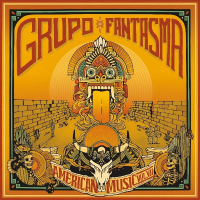 Grupo Fantasma
Grupo FantasmaAmerican Music Vol. VII
Blue Corn Music
2019
The thirteen new tracks on American Music Vol. VII celebrate Grupo Fantasma's first studio album in five years as well as the nineteenth anniversary of Austin's preeminent Tex-Mex party band.
In several ways, Vol. VII sounds like much of their previous music: This Grupo can spice up and rock an energetic, celebratory party sound that few other bands can match. But this music also sounds and feels different and as a result remains vibrant and vital, too.
Its clattering, polished surface comes from Grupo's collaboration with Miami-based Colombian musician, songwriter and producer Carlos "El Loco" Bedoya, who helps the band inject booster shots of Columbian folk rhythms and instruments throughout this set. "La Cruda" and the opening (and quite topical, as later explained) "El Fugitivo" feature Josh Baca on accordion, and the closing maritime mariachi "Sombra Roja" spotlights accordion courtesy of Mr. Vallenato.
Vol. VII also marks the first time that a singer from another band sings lead on a Grupo Fantasma song: Tomar Williams (of Tomar & the FCs) steps up to front the boogaloo chunk of funk "Let Me Be," shadowboxing with its horns and cowbells. It also presents one of their rare English lyrics in "LT," which roars and snarls through its guitar hook into a torrid funk-rock groove.
More than many sessions, American Music Vol. VII was impacted by where it was recorded: Sonic Ranch, long on the group's "musical bucket list" and the world's largest residential recording complex, located in the small border town of Tornillo, Texas. As the band began wrapping up final versions of their songs, Tornillo coincidentally became the site for one of the US government's immigrant border detention centers.
So, it's natural to wonder if "The Wall," this multicultural, multicolored tribal polyglot with Locos Por Juana and Ozomatli, builds into different layers of meaning. It's razor-sharp funk, with horns cutting into all the right, tight places, and background whoops and hollers supporting the sharp spoken-sung lead vocal, but its surrounding undercurrents run much deeper than funk music.
Upon its release, the band issued a statement that the title of American Music: Vol. VII was a "direct response to the concept of identity as well as the pigeon-holing of our music, which we've dealt with throughout our careers."
 Manu Katche
Manu Katchethe scOpe
Anteprima Prime Productions
2019
Manu Katche's tenth album as a leader, the ScOpe encompasses modern and ancient music, tribal and global music, and illustrates why he is not only one of the world's best drummers, but much more.
Katché entered the Paris Conservatory as a pianist but switched to percussion as his studies progressed; his mature style eventually incorporated his French and African roots into this classical training. the scOpe emphasizes the melodic nature, alongside the rhythmic and percussive nature, of Katché's unique drum style. "I have built the tracks around the drums, and it is no wonder I've always played that instrument—my Dad's from the Ivory Coast," he suggests.
the ScOpe features more songs with vocals than often found on a drummer's project. A beautiful ode to peace and love titled "Let Love Rule" co-written and performed with singer-songwriter Jonatha Brooke is this set's best song: Katché's gentle electronic background beat provides the rhythmic cushion for Brooke's earnest vocal, with Alexandre Tassel's plaintive flugelhorn easing in and out without creating so much as a ripple in the mix.
But there's no shortage of other beautiful music here. Katché polishes the repetitive groove of "Glow" until it shines, and its old-school soul strings in a space-age feel make the production somehow feel both full and full of empty space. He steers the straightforward beat "Please Do" toward but not quite into trip-hop, splashing his cymbals for maximum rhythmic effect.
Tuned percussion simultaneously plays the melody and rhythm that reveals the industrial-strength instrumental melancholy of "Goodbye For Now" to close this set in soft, reflective notes and tones. The electric rock, house and disco of "Tricky 98': Le Match de legend," recapturing a single he released in late 2018, feels tacked onto the end.
the scOpe illustrates that Manu Katché is more than Peter Gabriel's favorite drummer, or Sting's favorite drummer, or Joni Mitchell's favorite drummer or anybody else's anything. Manu Katché is more than one of the world's best drummers. He's simply a great musician.
Tracks and Personnel:
Long Waves
Tracks: Milonga; Try Again; Silli's Long Waves; One For The Kids; Old Folks; Silli's Waltz; On Green Dolphin Street.
Personnel: Franco Ambrosetti: trumpet, flugelhorn; John Scofield: guitar; Uri Caine: piano; Scott Colley: bass; Jack DeJohnette: drums.
No Boundaries
Tracks: Lennie's Pennies; Spy Movie End Credits; Agenbite of Inwit; If I Loved You; La Mulata Rumbera; Tango Adagio; Time of My Life; Siboney; Neither Have I Wings; Danzon No. 1; Swing Theory; In the Rain; Hallucinations.
Personnel: Karrin Allyson: vocals; Dave Bass: piano; Carlos Caro: bell, bongos, guiro; Carlos Henríquez: bass; Mauricio Hernández: maracas, timbales; Jerome Jennings: drums; Mauricio Herrera: percussion; Ted Nash: clarinet, flute, alto flute, alto sax, soprano sax, tenor sax; Miguel Valdes: bata, congas.
Night Sparkles (Live)
Tracks: End of Firpo Part 1; End of Firpo Part 2; Dance of the Machine Elves; Night Sparkles; Ecstatic Cling Part 1; Ecstatic Cling Part 2.
Personnel: David Tronzo: slide guitar; Paul Schultheis: Rhodes, Moog, melodica; Mike Rivard: bass, sintir; Vicente Lebron: congas, percussion; Dean Johnston: acoustic drums, electronic drums; Moussa Traore: djembe (#3-#6); Leo Blanco: melodica (#6).
Os Catedráticos 73
Tracks: Arranha Ceu (Skyscrapers); Flap; Rodando Por Ai (Rudy's); O Jogo (Soccer Game); Atire A 1a Pedra; Puma Branco (The White Puma); Passarinho Diferente (The Byrd); Extremo Norte (The Gap); To Fazendo Nada (Down The Hill); Menina (Boy Meets Girl); Carlota & Carolina (Carly & Carole).
Personnel: Eumir Deodato: leader, piano, RMI electric piano, organ, arranger, conductor; Durval Ferreira: guitar; Zé Menezes: guitar; Sergio Barroso: electric bass; Ivan "Mamão" Conti, drums; Bebeto: congas; Hélcio Milito: percussion; Orlann Divo: percussion; John Frosk: trumpet, flugelhorn; Marvin Stamm: flugelhorn, trumpet; Phil Bodner: tenor saxophone, flute; Wayne Andre: trombone; Romeo Penque: baritone saxophone, flute.
Monk Time
Tracks: Well You Needn't; Monk's Dream; Monk's Mood; Blue Monk; Little Rootie Tootie; Ugly Beauty; We See; Epistrophy.
Personnel: Leon Lee Dorsey: bass; Greg Skaff: guitar; Mike Clark: drums.
American Music Vol. VII
Tracks: El Fugitivo; Nubes; LT; Qué Es Lo Que Quieres De Mi?; The Wall; La Cruda; Nosotros; Let Me Be; Ausencia; Hot Sauce; Cuidado; Yo Quisiera; Sombra Roja.
Personnel: Josh Baca: accordion; Mr. Vallenato: accordion; Angela Miller: backing vocals; Lauren Cervantes: backing vocals; The Soul Supporters: backing vocals; Josh Levy: bariton saxophone; Greg Gonzalez: bass; Wil-Dog Abers: bass; Matthew "Sweet Lou" Holmes: congas, bongos; Sunny Jain: dhol; John Speice: drums, percussion; Beto Martinez: guitar; Raul Pacheco: guitar; Kino Esparza: lead vocals, hand percussion; Carlos "El Loco" Bedoya: keyboards, backing vocals; Dan Bechdolt: tenor saxophone, alto saxophone; Mark "Speedy" Gonzales: trombone, trumpet; Gilbert Elorreaga: trumpet; Itawi Correa: vocals; Justin Poree: vocals; Tomar Williams: vocals, keyboards; Jaime Ospina: vocals, percussion, gaita; José Galeano: vocals, timbales.
the scOpe
Tracks: Keep Connexion; Glow; Vice; Overlooking; Please Do; Paris Me Mange; Let Love Rule; Don't U Worry; Goodbye For Now; Tricky 98': Le Match de légend.
Personnel: Manu Katché: drums, percussion, vocals; Jim Grandcamp: guitar; Kandia Kouyaté: kora; Frédéric Kret: cello; Michael Nguyen: viola; Hugues Borsarello: violin; Kayla Galland: vocals; Faada Freddy: vocals; Jazzy Bazz: vocals; Alexandre Tassel: flugelhorn; Jonatha Brooke: vocals.
Tags
From the Inside Out
Chris M. Slawecki
Franco Ambrosetti
Charlie Parker
Miles Davis
Scott Colley
Jack DeJohnette
Uri Caine
John Scofield
dave bass
Lennie Tristano
Bud Powell
Carlos Henriquez
Jerome Jennings
Carlos Caro
Mauricio Herrera
Miguel Valdes
Ted Nash
Elmo Hope
Karrin Allyson
Club d'Elf
Mike Rivard
Moussa Traore
Vicente Lebron
Dean Johnston
Paul Schultheis
David Tronzo
Robert Quine
Sun Ra Arkestra
Wild Tchoupitoulas
Eumir Deodato
Sergio Barroso
Orlandivo
Ivan 'Mamão' Conti
Azymuth
Brother Jack McDuff
Sergio Mendes
Brasil '66
Quincy Jones
Joe Sample
The Crusaders
DSC Band
Leon Lee Dorsey
Greg Skaff
Mike Clark
Thelonious Monk
Hal Overton
Grupo Fantasma
Josh Baca
Locos Por Juana
Ozamatli
Manu Katche
Jonatha Brooke
Alexandre Tassel
Peter Gabriel
Sting
Joni Mitchell
PREVIOUS / NEXT
Support All About Jazz
 All About Jazz has been a pillar of jazz since 1995, championing it as an art form and, more importantly, supporting the musicians who make it. Our enduring commitment has made "AAJ" one of the most culturally important websites of its kind, read by hundreds of thousands of fans, musicians and industry figures every month.
All About Jazz has been a pillar of jazz since 1995, championing it as an art form and, more importantly, supporting the musicians who make it. Our enduring commitment has made "AAJ" one of the most culturally important websites of its kind, read by hundreds of thousands of fans, musicians and industry figures every month.










